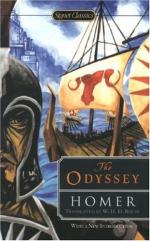Telemachus saw her long before any one else did. He was sitting moodily among the suitors thinking about his brave father, and how he would send them flying out of the house, if he were to come to his own again and be honoured as in days gone by. Thus brooding as he sat among them, he caught sight of Minerva and went straight to the gate, for he was vexed that a stranger should be kept waiting for admittance. He took her right hand in his own, and bade her give him her spear. “Welcome,” said he, “to our house, and when you have partaken of food you shall tell us what you have come for.”
He led the way as he spoke, and Minerva followed him. When they were within he took her spear and set it in the spear-stand against a strong bearing-post along with the many other spears of his unhappy father, and he conducted her to a richly decorated seat under which he threw a cloth of damask. There was a footstool also for her feet,{2} and he set another seat near her for himself, away from the suitors, that she might not be annoyed while eating by their noise and insolence, and that he might ask her more freely about his father.
A maid servant then brought them water in a beautiful golden ewer and poured it into a silver basin for them to wash their hands, and she drew a clean table beside them. An upper servant brought them bread, and offered them many good things of what there was in the house, the carver fetched them plates of all manner of meats and set cups of gold by their side, and a manservant brought them wine and poured it out for them.
Then the suitors came in and took their places on the benches and seats. {3} Forthwith men servants poured water over their hands, maids went round with the bread-baskets, pages filled the mixing-bowls with wine and water, and they laid their hands upon the good things that were before them. As soon as they had had enough to eat and drink they wanted music and dancing, which are the crowning embellishments of a banquet, so a servant brought a lyre to Phemius, whom they compelled perforce to sing to them. As soon as he touched his lyre and began to sing Telemachus spoke low to Minerva, with his head close to hers that no man might hear.
“I hope, sir,” said he, “that you will not be offended with what I am going to say. Singing comes cheap to those who do not pay for it, and all this is done at the cost of one whose bones lie rotting in some wilderness or grinding to powder in the surf. If these men were to see my father come back to Ithaca they would pray for longer legs rather than a longer purse, for money would not serve them; but he, alas, has fallen on an ill fate, and even when people do sometimes say that he is coming, we no longer heed them; we shall never see him again. And now, sir, tell me and tell me true, who you are and where you come from. Tell me of your town and parents, what manner of ship you came in, how your crew brought you to Ithaca, and of what nation they declared themselves to be—for you cannot have come by land. Tell me also truly, for I want to know, are you a stranger to this house, or have you been here in my father’s time? In the old days we had many visitors for my father went about much himself.”




